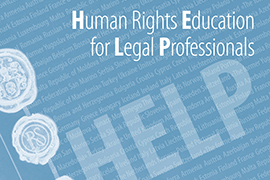Courses
Data Protection and Privacy Rights
People can easily become victims of data protection violations brought on by the widespread use of information and communication technologies by public and private actors.

The ‘HELP in the EU’ course on Data Protection and Privacy Rights offers a comprehensive curriculum which covers in an interactive way the key concepts, the legal framework of the Council of Europe (CoE) and the EU as well as the case law or the European Court of Human Rights (ECtHR) and of the Court of Justice of the European Union (CJEU).
One of the key reference materials to develop this course has been the Handbook on Data Protection developed jointly by the EU Fundamental Rights Agency and the CoE together with the Registry of the ECtHR. The course takes into account the EU Reform adopted in April 2016.
You will also learn to identify violations and apply remedies in specific areas of data protection and privacy rights such as: medical sector; media; development of new technologies (i.e. GPS, drones, CCTV); e-communication and marketing ; workplace surveillance.
See here a presentation video of the course.
Fight against racism, xenophobia and homophobia / transphobia
Racism and xenophobia are a widespread problem in Europe today, with anti-immigrants attitudes on the rise. Across the EU, LGBT persons and other vulnerable groups continue to face discrimination, violence and exclusion.
 The ‘HELP in the 28’ course “Fight against Racism, Xenophobia, Homophobia and Transphobia” covers in an interactive way the key concepts, the European non-discrimination law (from the Council of Europe and EU) and the impressive body of case law of the European Court of Human Rights (ECtHR) and of the Court of Justice of the European Union (CJEU), in addition to decision of the European Committee of Social Rights.
The ‘HELP in the 28’ course “Fight against Racism, Xenophobia, Homophobia and Transphobia” covers in an interactive way the key concepts, the European non-discrimination law (from the Council of Europe and EU) and the impressive body of case law of the European Court of Human Rights (ECtHR) and of the Court of Justice of the European Union (CJEU), in addition to decision of the European Committee of Social Rights.
More specifically, the course has two substantive modules, one addressing racism and xenophobia, and the other one on homophobia and transphobia. A link to a specific module on Roma, the largest minority in the EU is also provided. One of the key reference materials to develop this course has been the Handbook on European non-discrimination law developed jointly by the EU Fundamental Rights Agency and the European Court of Human Rights.
Existing case law covers topics as varied as: discrimination during job recruitment or at the workplace; discrimination receiving health care; hate crimes, hate speech or harassment on racism or homophobic grounds; lack of respect for private and family life of LGBT persons; legal gender recognition.
You can watch a video presenting the course at https://www.youtube.com/watch?v=unLn2dbHE8w
Labour Rights
In times of economic recession, the creation of jobs as well as the protection of labour rights is of utmost importance. A better understanding of the human rights’ dimension of labour rights by legal professionals is needed.

The ‘HELP in the 28’ course on “Labour Rights” covers in an interactive way the key concepts, the European system of protection of labour rights (stemming from the CoE and EU) and the case law of the European Court of Human Rights (ECtHR), the Court of Justice of the European Union (CJEU) as well as decisions of the European Social Committee.
Through this course, legal professionals will gain practical understanding of when and how to apply the European system of protection of labour rights.
More specifically, the course has the following substantive modules: right to work, employment relationship and working time; pay and insolvency; termination of employment (insolvency); discrimination - equal opportunities; collective labour rights (information and consultations); health and safety (physical and mental).
You can watch a video presenting the course at https://www.youtube.com/watch?v=PcaCio17IQw
Right to the Integrity of a person
The right to integrity of the person is based on what it means to be a person. It is linked to the idea of human dignity and that each person’s physical and mental space ought to be protected. It is a broad right, which includes the prohibition of physical and mental torture, inhuman and degrading treatment and punishment, as well as a wide range of less grave forms of interference with a person’s body and mind.

It also reviews the case law of the European Court of Human Rights (ECtHR) and the Court of Justice of the European Union (CJEU) pointing out to problems such as medical interventions or removal of organs without consent, medically assisted procreation or end-of-life situations.
You can watch a video presenting this course at https://www.youtube.com/watch?v=Zh4FQ9gQe-0&feature=youtu.be
More specifically, the course is composed of two substantives parts: the first part presents the right to integrity in general which has been traditionally covered by the right to private life and the prohibition of torture; the second part will cover the right to integrity in the specific fields of medicine and biology.




